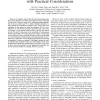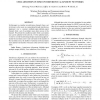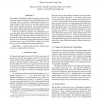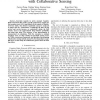134
click to vote
INFOCOM
2012
IEEE
13 years 4 months ago
2012
IEEE
—We study the capacity and delay scaling laws for cognitive radio network (CRN) with static primary users and heterogeneous mobile secondary users coexisting in the unit planar a...
111
click to vote
ICC
2011
IEEE
14 years 1 months ago
2011
IEEE
—In cognitive radio (CR) networks, licensed spectrum that can be shared by secondary users (SUs) is always restricted by the needs of primary users (PUs). Although channel aggreg...
148
click to vote
CORR
2011
Springer
14 years 5 months ago
2011
Springer
—The fundamental problem of multiple secondary users contending for opportunistic spectrum access over multiple channels in cognitive radio networks has been formulated recently ...
133
click to vote
ICASSP
2011
IEEE
14 years 5 months ago
2011
IEEE
In this paper we consider an interference channel where a set of primary active users are cooperating through interference alignment over a constant multiple-input-multiple-output...
132
click to vote
ICASSP
2011
IEEE
14 years 5 months ago
2011
IEEE
The problem of distributed multiuser medium access of a hierarchical cognitive radio network with multiple primary and secondary users is considered. Each primary user has a licen...
132
click to vote
ICASSP
2011
IEEE
14 years 5 months ago
2011
IEEE
Efficient design of cognitive radio networks calls for secondary users implementing adaptive resource allocation, which requires knowledge of the channel state information in ord...
141
click to vote
TWC
2010
14 years 8 months ago
2010
In this paper, a primary (licensed) user leases part of its resources to independent secondary (unlicensed) terminals in exchange for a tariff in dollars per bit, under the constra...
132
click to vote
JSAC
2011
14 years 9 months ago
2011
—Various spectrum management schemes have been proposed in recent years to improve the spectrum utilization in cognitive radio networks. However, few of them have considered the ...
129
click to vote
GLOBECOM
2009
IEEE
14 years 11 months ago
2009
IEEE
Uncertain capacity in newly emerged Cognitive Radio Networks(CRN) renders specific performance analysis for the secondary users (SUs), particularly in the aspects of Qualityof-Serv...
144
click to vote
INFOCOM
2010
IEEE
14 years 12 months ago
2010
IEEE
Recently, a cooperative paradigm for single-channel cognitive radio networks has been advocated, where primary users can leverage secondary users to relay their traffic. However, i...




